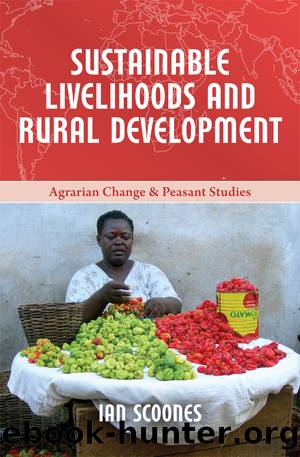Sustainable Livelihoods and Rural Development by Ian Scoones

Author:Ian Scoones [Scoones, Ian]
Language: eng
Format: epub
ISBN: 9781552667743
Google: 1NR7rgEACAAJ
Barnesnoble:
Goodreads: 26224996
Publisher: Fernwood Pub.
Published: 2015-01-15T02:35:42+00:00
Chapter 6
Livelihoods and Political Economy
Livelihoods unfold in particular contexts and are profoundly influenced by power and politics. Chapter 4 focused on the institutional, organizational and policy processes that affect livelihood strategies and outcomes, while Chapter 5 focused on the political negotiation of pathways to sustainable livelihoods. But there is a broader context too, within which we must situate any livelihoods analysis. This is the context of long-term, historical patterns of structurally defined relations of power between social groups, of processes of economic and political control by the state and other powerful actors, and of differential patterns of production, accumulation, investment and reproduction across society. In other words, the political economy of livelihoods.1
Unity of the Diverse
While Karl Marx and other classical political economists were interested in these broader patterns, and in the historical processes defining the changing relationships between capital and labour over time, they were also interested in the underlying, diverse determinations that gave rise to these patterns. In his treatise on method mentioned in Chapter 1, Grundrisse, Marx argued that a critical political economy approach that aims to expose the ârich totality of many determinations and relationsâ also helps expose a âconcreteâ understanding that thus emerges through iteration between conceptual abstractions and detailed empirical observation: âThe concrete is concrete because it is the concentration of many determinations, hence unity of the diverseâ (Marx 1973: 100â101). To avoid âa chaotic conception of the whole,â he explains how he employed a dialectical method that moved
analytically towards ever more simple concepts, from the imagined concrete towards ever thinner abstractions until I had arrived at the simplest determinations. From there the journey would have to be retraced until I had finally arrived at the population again, but this time not as a chaotic conception of a whole, but as a rich totality of many determinations and relations. (1973: 100)
Thus, he argued, we can better understand the world by looking at both material/structural and relational aspects.
Such a grounded political economy approach allows for the detailed description of a diversity of livelihood strategies, and an evaluation of longer-term livelihood trajectories and their structural conditioning and shaping. This approach also focuses on the political and economic alliances being forged between different classes, and so the structuring of the wider political economy. As Henry Bernstein argues (2010a: 209), it is this movement between the specifics of diverse livelihood contexts and the wider abstractions and tendencies associated with a relational and dynamic understanding of class that offers important insights into longer-term trajectories of agrarian change and processes of differentiation. Bridget OâLaughlin (2002, 2004) echoes this argument in her appeal to go beyond the descriptive, purely empirical method in livelihood analysis towards a more theorized conception of livelihoods within structural contexts. Hers is not an appeal for a meta-theory; that era has almost certainly passed (Sumner and Tribe 2008). Rather it is a call for attention to the tensions, contradictions and opportunities that arise between the highly specific, diverse, complex and contextual and the wider structural, historical and relational forces that continuously shape and reshape what is possible for whom.
Download
This site does not store any files on its server. We only index and link to content provided by other sites. Please contact the content providers to delete copyright contents if any and email us, we'll remove relevant links or contents immediately.
Harry Potter and the Goblet Of Fire by J.K. Rowling(3024)
Never by Ken Follett(2871)
Shadow of Night by Deborah Harkness(2709)
Ogilvy on Advertising by David Ogilvy(2677)
Zero to IPO: Over $1 Trillion of Actionable Advice from the World's Most Successful Entrepreneurs by Frederic Kerrest(2374)
The Man Who Died Twice by Richard Osman(2289)
Machine Learning at Scale with H2O by Gregory Keys | David Whiting(2263)
Book of Life by Deborah Harkness(2258)
How Proust Can Change Your Life by Alain De Botton(2255)
My Brilliant Friend by Elena Ferrante(2217)
0041152001443424520 .pdf by Unknown(2214)
The Tipping Point by Malcolm Gladwell(2200)
How to Pay Zero Taxes, 2018 by Jeff A. Schnepper(2094)
Will by Will Smith(2032)
Purple Hibiscus by Chimamanda Ngozi Adichie(1977)
Hooked: A Dark, Contemporary Romance (Never After Series) by Emily McIntire(1932)
Borders by unknow(1779)
Rationality by Steven Pinker(1760)
Daughter of Smoke and Bone by Laini Taylor(1737)
